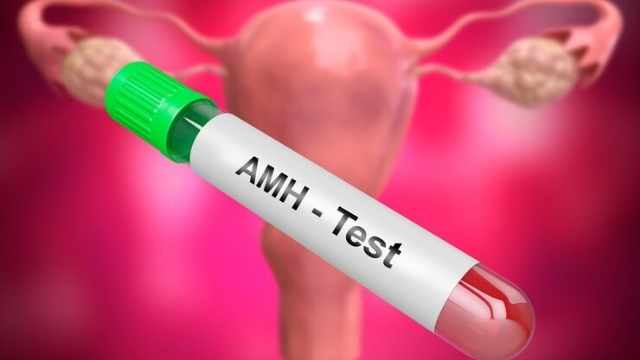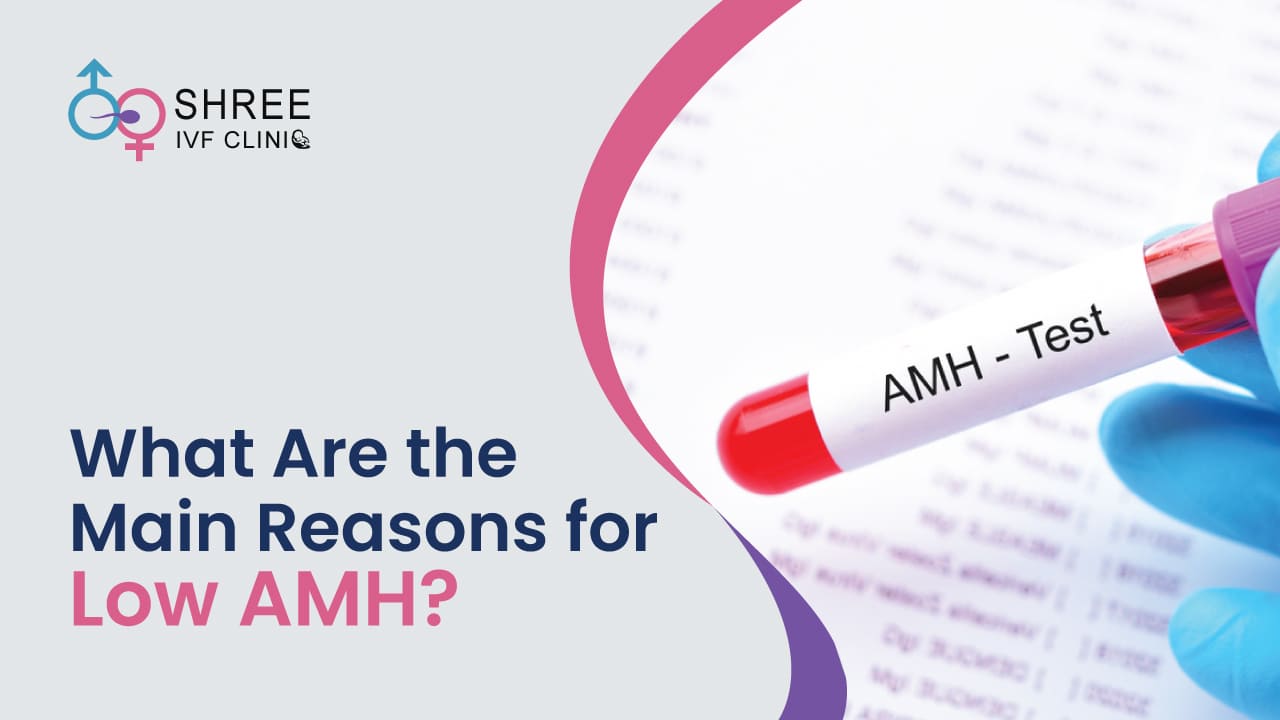Home » Infertility » Low Anti-Müllerian Hormone Treatment/Diminished Ovarian Reserve Treatment
Low AMH Treatment at Shree IVF Clinic, Mumbai

Introduction
Anti-Mullerian Hormone is the full form of AMH. It is a protein hormone that is mainly produced in small follicles (which are those tiny pouches that contain eggs in the ovary) by the granulosa cells.
The Granulosa cell is a type of cell that helps the eggs develop in a woman’s ovaries. The maximum amount of AMH is mainly given by these cells when the follicles are in the preantral and small antral stages of their development.
As the follicles grow larger, the amount of AMH produced begins to decrease. When a follicle reaches approximately 8 mm in size, the amount of AMH that is still being produced is almost nonexistent.
As preantral and small antral follicles are always present in the ovaries, this means that AMH levels are constant from day to day. That is why an AMH test can be done on any day of a woman’s cycle to know the number of eggs that are left in her ovaries.
The common confusion amongst the patients is that this test is required to be done on a specific day of the menstrual cycle., The report is usually available within 3 to 4 hours of doing the test; it costs approximately ₹2500 in India.
It is important to understand that this test is essential for every patient who wishes to achieve conception.
Everything You Need to Know About Low AMH
Low AMH | Causes | Symptoms | Low AMH and Fertility issues | What To Expect | Treatment | FAQs
What is Low AMH?
If someone has a low AMH level, it indicates that her ovaries are producing fewer preantral follicles. So, the AMH level mainly provides information about the number of eggs that are present in the ovary. If you have a high AMH level, that means you have more eggs, and a low AMH level means you have fewer eggs left in your ovary.
Both high and low AMH are not good for the overall reproductive health of a female; women with very high levels of AMH may suffer from something called severe Polycystic Ovary Syndrome (PCOS), in which the production of the egg is severely hampered, and the majority of them are required to do ovulation induction to make sure that they eat correctly so that they can go ahead and have a natural pregnancy.
The levels of AMH will naturally become low when you are in your advanced stage. Still, if you face low AMH levels in your younger stage, then the chances of premature ovarian failure will increase. Besides, it also decreases the chance of getting pregnant naturally.
In India, a survey says that almost half of the 29,621 women who are in the 20-40 age group had low AMH levels.
Based on the standard directive, an AMH value of less than 1.2 ng/mL is considered to be a low AMH value.
As a patient, you should simply understand that this indicates the capacity of your ovary to respond to stimulation, just because you have a low AMH. It does not mean that you will not be able to become pregnant naturally, or you may have to end up doing IVF, only to make sure that a conception occurs.
Causes of Low AMH
There can be various reasons for having a low AMH level. So, let’s discuss some of the major reasons below:
- Age
One of the major reasons behind having a low AMH level is age. All women are born with all the eggs that they are going to have in their lifetime. Then, after that, these eggs are naturally used during the ovulation cycle throughout life until the time of menopause. Therefore, ovarian reserves will decrease over time along with the level of AMH as she gets older.
When women are in their mid-30s, the number of eggs starts decreasing. That is why the chances of the fertility of a woman also start to decrease as AMH starts depleting by then.
- Very Poor Diet
Processed food and fat are not a good option for healthy AMH levels. Unhealthy foods will affect your body, which results in obesity, and that can be the reason for various health issues, such as low AMH levels.
- Endometriosis
It is a condition where tissues that are generally grown inside a woman’s uterus grow outside of the uterus. Endometriosis is a very painful disorder in the reproductive system that causes inflammation in the ovaries and the fallopian tubes, which results in a low AMH level.
- PCOS (Polycystic Ovary Syndrome)
It is now one of the most common female reproductive disorders in which your ovary produces an abnormal amount of male sex hormones. So, the small cyst in your ovary can affect the AMH level.
- The genetic factor
The inherited genetic disorder can be one of the reasons behind the low AMH level. If you have anyone in your family with a low AMH level, then genetically, it can affect your AMH level as well.
- Autoimmune diseases
In this case, your immune system mainly attacks your healthy cells along with your healthy eggs, which can lower your AMH level.
- Cancer treatment or Chemotherapy
If anyone is undergoing cancer treatment, then it damages the healthy follicles of their ovary, which causes a low AMH level.
An important point to note is that when a young woman undergoes chemotherapy, doctors may recommend GnRH agonist injections. However, despite this, nearly 90% of the ovarian reserve is still lost due to the effects of chemotherapy.
- Mental Health
Stress can be a cause of having a low AMH level. If someone is living with mental health issues, then it automatically lowers the chances of getting pregnant. It is necessary to be healthy and have a healthy mind if someone is trying to conceive. Also, de-stressing can correct the level of AMH.
- Change in lifestyle
The changes in your lifestyle can also affect the level of AMH, such as excessive smoking, obesity, pollution, Vitamin D deficiency, etc.
Book Your Consultation Today With a Low AMH Specialist in Mumbai, India—Dr. Jay Mehta
Symptoms of Low AMH Levels
Generally, low AMH does not have any specific symptoms, but if you see any general symptoms like irregular periods, short cycles, or premature menopause, then you should consult with a doctor.
Low AMH and Fertility issues
AMH level mainly indicates the woman’s ovarian reserve. It does not define infertility. There is no such relationship between the level of AHM and infertility. The main thing is that women’s fertility decreases as they age, and this is associated with the decrease in AMH levels.
Fertility depends on the number of eggs women have. So, if someone has fewer eggs or no eggs, then the chances of conceiving decrease. Furthermore, the quality of the eggs can be affected by the level of AMH, which increases the chances of miscarriage or abnormal fertilization. This is why older women with low AMH levels are being advised to get the treatment properly.
However, it is seen that younger women have fewer chances of not getting pregnant even if their AMH level is low. Besides that, a survey said that over 38% of women ages 26-30 were reported to have extremely low AMH levels. So, if you do the blood test, the AHM levels only show you the potential number of follicles in your ovary.
Options if you have low AMH levels?
There are lots of options available if you have low AMH levels. But it is very difficult to know which will be the best for you. You can surely consult with your doctor about it. If you do a blood test and it shows that you have a low AMH level, you do not have to worry about it, as you can increase the level naturally with certain lifestyle changes.
If you’re worried about your AMH levels, consult with Dr. Jay Mehta, a fertility specialist in Mumbai, for more guidance on fertility options.
What to expect from a doctor if you have low AMH levels?
For women who are interested in getting pregnant but have low AMH levels, doctors suggest they go for the IVF (in vitro fertilization) option. Other methods or treatments like ARTs (Assisted Reproductive Technology) are available as well.
There are so many tests as well to evaluate fertility, along with the AMH blood tests, such as the FSH blood test (Follicle Stimulating Hormone) and AFC blood test (Antral Follicle Count). Sometimes, medical experts recommend that their patients lead a healthy lifestyle so that it improves the egg quantity in their ovaries and eventually increases the level of AMH.
Treatment with low AMH level
There is no complete cure for low AMH. But there are ways available through which a woman can improve her AMH level before going for ART as an option. Along with different treatments, natural treatments are there to increase the level of AMH, such as
- Yoga and Regular Exercise.
- Balanced Diet
- Acupuncture
- DHEA (Dehydroepiandrosterone) supplements. DHEA is mainly a hormone that has the ability to improve the quality and quantity of eggs. However, such types of drugs are to be consumed with a very strong amount of caution because the majority of the time, patients believe that it is this drug that is going to solve their AMH values and increase their AMH values.
Also, please make sure that if you have a low AMH value, it does not indicate that you need to do IVF, and especially in a country like India, you should make sure that you are not going to be pushed to do treatment with donor eggs.
No matter what, you are going to be promised that the eggs sourced are going to come from ART banks, and the majority of the clinics in India will give you a fancy offering, and you have to be utterly careful of such types of situations.
It should be noted that the majority of the women, despite having a very low AMH, will end up conceiving using their own eggs, and as a result of this, if you are a patient, kindly go to a healthcare practitioner who understands the science properly and treats you accordingly, rather than simply going to a clinic that is located close to your home and falling prey to fancy marketing practices.
IVF with low AMH level
A successful pregnancy mainly depends on the woman’s ovarian reserve. For them, IVF is the best option that can make optimal use of the limited eggs that are left in their ovaries.
If any woman has abnormally raised FSH levels along with low AMH levels, then it is an indication that the right quantity and good quality eggs are not being produced by the ovaries. It means that she is not fertile enough.
Certain specialised protocols are available for ovarian stimulation in women who have a low AMH value
1. Random start stimulation is an excellent technique to stimulate women who have low AMH.
2. In the vast majority of patients, I also prefer to use something called a luteal phase stimulation.
If you’re doing IVF with low AMH, remember one thing: you will end up getting approximately 3 to 5 good-quality eggs. Then it comes down to the clinic that you have chosen and how good the doctor and the embryologist in the facility are to make sure that with a limited number of eggs, these eggs are optimally utilized, what the laboratory protocol is, and how many blastocyst embryos you actually get out of this.
Many religions in India do not allow for the treatment with donor eggs, and we have to respect their religious and social choices because, at the end of the day, even with extremely low AMH, women end up having a child using their eggs
As a specialized referral unit for patients with AMH across the country, we end up delivering more than 50 patients every year who have conceived with our treatment, with an AMH of less than 0.1. This is an indicator of how beautifully the correctly done treatment works on a well-selected patient in order to make sure that they end up having a conception.
At our Shree IVF & Endometriosis clinic in Mumbai, we have recently introduced the oocyte spindle assay, which is a highly specialized technique for patients with very low AMH. This advanced method helps us locate the spindle in single oocytes, improving the chances of healthy embryo formation. While its exact impact on IVF success rates is still under study, it offers new hope for women struggling with low ovarian reserve.
We also recommend trial stimulation cycles for such patients. This approach helps us assess the ovarian response before moving to a full IVF cycle, ensuring that patients do not spend unnecessarily or lose valuable time.
Another important option for women with very low AMH is NICS (Non-Invasive Chromosomal Screening) of embryos, which provides crucial genetic insights and can significantly improve treatment planning and outcomes.
FAQs on Low AMH & Fertility
Does the AMH tell me anything about my chances of getting pregnant right now?
No, the AMH test does not provide any information on pregnancy. The AMH level can not predict anyone’s fertility. It depends on many other factors, like the condition of the fallopian tubes, the quality of your partner’s sperm, your time of ovulation, etc.
You can be pregnant even if you have a low AMH level at a younger age. If you have regular cycles, then the chances of your pregnancy increase. Here, age is the major factor instead of the level of AMH. However. A low AHM level can indicate that you have a short span left to get pregnant.
Does the AMH tell me anything about my chances of conceiving in the future?
As AMH can detect the ovarian reserve, this is why it is possible that the AMH test can give you an idea about your ovarian condition. If you are in premature menopause, then you will get to know about it.
In premature menopause, you lose all of your eggs and will become unable to reproduce eggs anymore. So, it is recommended to all women that they need to do an AMH test so that they can take precautions before anything worse happens.
I have low AMH. Does it mean I am infertile?
No, this is absolutely not true. If you are having regular periods and ovulating one egg per month. Then you are fertile like others who have normal AMH levels. AMH level does decrease your ovarian reserve, but that does not mean you won’t be able to conceive in the future.
On the other hand, you can increase your AMH level by maintaining a healthy lifestyle and a good diet. Moreover, if you want to get pregnant immediately and have gone through the treatment for low AMH, then it is recommended to consult with a fertility expert now.
I was found to have high AMH levels. Does it mean I am super fertile?
No, it is not true at all. You will produce one egg per month, like others. On the contrary, you can face problems with your period. You can have irregular periods due to high AMH levels.
PCOS (Polycystic Ovary Syndrome) can happen due to a high level of AMH, and because of this, your chances of getting pregnant can be decreased. Apart from this, the good news is that you have a lower chance of having early menopause. It will improve the chances of success in your IVF treatment.
Why do fertility clinics check AMH levels?
An AMH test is usually done by fertility experts just to check a woman’s ability to produce eggs that will be fertilized for pregnancy. With fertility medication, a woman’s ovary ovulates multiple eggs, and fertility experts take those eggs all at once to use them in IVF.
Here, the AHM test can predict how many of those eggs are likely to mature in one IVF cycle. Moreover, predicting the ovarian response through the AMH test is important in achieving success in IVF.
What are the specialized stimulation protocols available for women with low AMH?
In women with low AMH, I usually prefer random start stimulation or luteal phase stimulation. This is because such patients often show asynchronous follicle development. In addition, I use a pretreatment antagonist protocol, which helps maintain synchrony and provides better management for both the patient and the treatment outcome.
Is there any special trigger used for women with low AMH?
For low AMH patients, a standard trigger is usually sufficient—either hCG 10,000 units or 0.3 GnRH agonist.

Dr. Jay Mehta
MBBS, DNB—Obstetrics & Gynecology
IVF & Endometriosis Specialist, Laparoscopic Surgeon (Obs & Gyn)
Dr. Jay Mehta is a highly renowned IVF specialist and fertility-preserving surgeon based in Mumbai, India. As the director of the Shree IVF and Endometriosis Clinic, Mumbai, he is recognized as one of India's leading laparoscopic gynecologists for the advanced treatment of complex conditions such as endometriosis and adenomyosis.
Dr. Mehta's expertise extends deeply into reproductive medicine; he is a well-known IVF specialist and among the few practitioners in the country with specialized knowledge in embryology, andrology, reproductive immunology, and Mullerian anomalies. Dr. Mehta conducts operations and consultations across India's major cities, including Pune, Chennai, Hyderabad, Bangalore, Ahmedabad, Agra, and Delhi. To book an appointment, call: 1800-268-4000
Many Treatments. One Goal.
Caring for Every Patient, Every Day.
Sandhya Yadav
I got pregnant through ivf done by Dr Jay mehta, even though my husband had azoospermia with my own eggs and his sperm. NO DONOR PROGRAM done. I am 5 months pregnant and even the pregnancy progress and checkups are great… Best IVF and PREGNANCY hospital in India… Dr Jay is a magician
Vikas Maurya
We concieved with Dr Jay Mehta with his superlative natural medications and therapy. He micromanages the cases. We have spent 6 years with other speciliasts.
With due respect, dr jay mehta is the best fertility expert in mumbai city. He is very honest to patients. He gives everything in writing. He gives very frank hopes. He is possitive in attitude which helps patients.
He also give concession to us considering the financial problems due to virus pandemic. I cannot imagine to have met such a doctor, who doesnt think of money at all. I dont know about all doctors as i have had some bad experiences, but dr Jay Mehta is definitely next to GOD. He gets results out of absolute honesty and for anyone trying for infertility, he is a must meet person.
Shefali Parekh
Dr Jay Mehta is an excellent IVF specialist. He and his wonderful team are responsible for excellent results here. The great thing is that Dr Jay does the egg pick up and embryo transfer himself for all patients. They are very good with the financial counselling of the procedure. The cost will almost never escalate. We are very happy with the services of the premises.
Swadha Kotpalliwar
Dr Jay is definitely one of the finest laparoscopic surgeon and ivf specialist. His surgeries are a treat for many many Gynecologist to watch. Kind by heart and his teachings are valuable , one can’t afford to miss !!
Blogs

One Blocked Tube, Low AMH, and Still Not Pregnant? An Expert’s Guide
Low AMH and one blocked tube affect fertility differently. Here’s what it means and how couples can still conceive

What Are the Main Reasons for Low AMH?
AMH is also known as the Anti-Mullerian Hormone. The level of AMH indicates the chance of getting pregnant in women.
Videos

Does Endometriosis Affect the Value of the Anti-mullerian Hormone (AMH)?
Yes, endometriosis can impact your AMH level by damaging the ovaries, fallopian tubes, and surrounding pelvic area.

Is It Possible to Get Pregnant With Your Own Eggs if Your Amh Level Is Less Than 0.5?
The anti-Müllerian hormone is produced in the ovaries by the granulosa cells of developing follicles (during their early stages of development).


